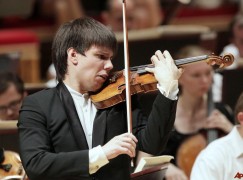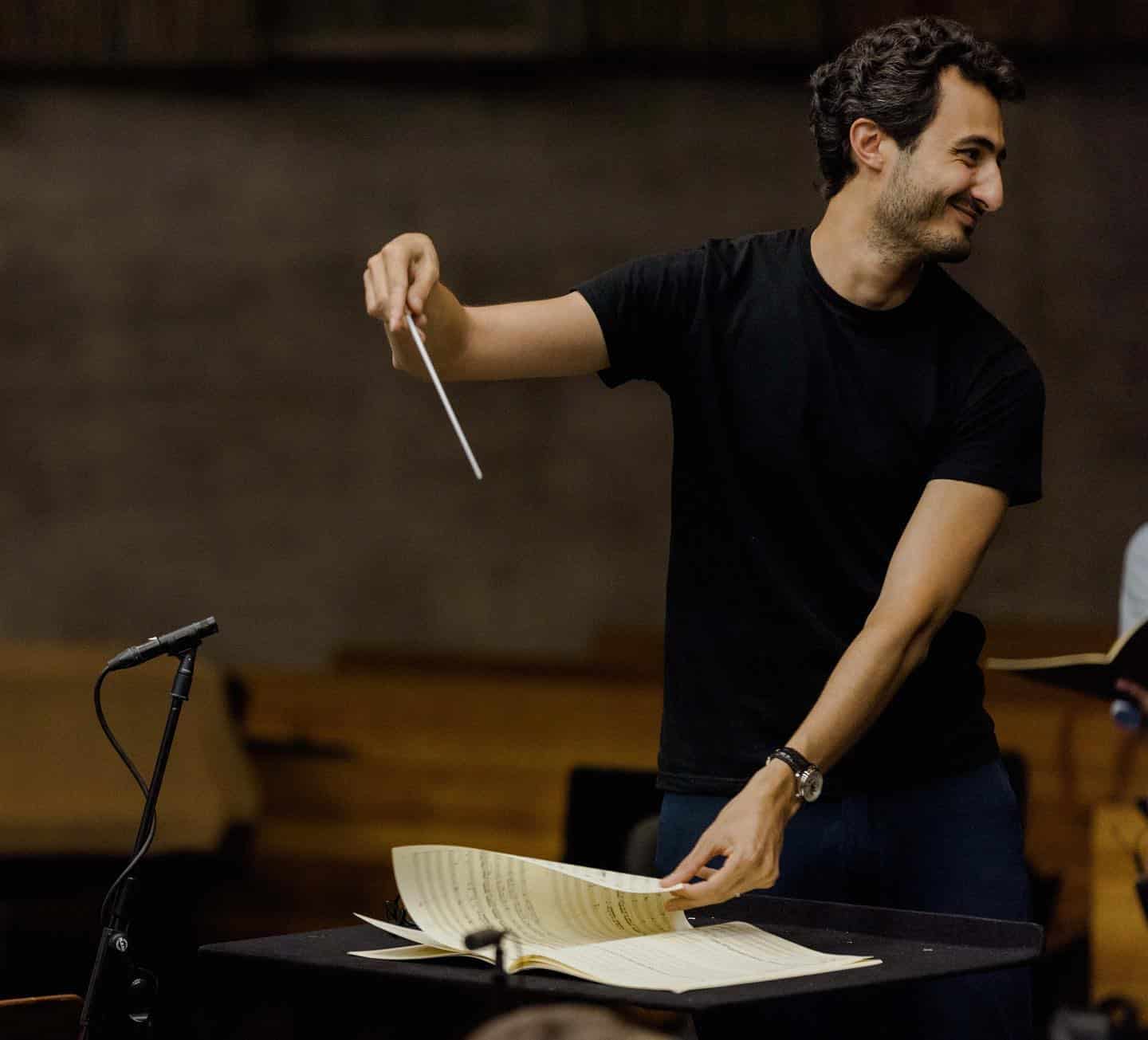Shanghai fix: Half the finalists were taught by two of the judges
mainThe six finalists of the inaugural Shanghai Isaac Stern International Violin Competition were named today. They are:
Richard Lin (United States/Taiwan)
Mayu Kishima (Japan)
Sergei Dogadin (Russia)
Stefan Tarara (Germany)
Ming Liu (China)
Sirena Huang (US)
We warned before the contest opened that two of the judges tend to pick their own students as winners.
That’s exactly what has happened.
Kishima and Tarara are students of the compromised Zakhar Bron. Tarara works as Assistant to Prof. Zakhar Bron in Interlaken, Switzerland. Impossible to imagine that Bron’s judging could be objective.
Dogadin is Boris Kushnir’s pupil. He has already won the Joseph Joachim Competition, which Kushnir judged.

This is why we keep campaigning for competitions to be cleaned up.
UPDATE: David Stern: My father would have been proud of this competition





half? at least 4! the chinese girl studies with Vera -isn’t she one of the judges?
Wondering if Sergei Dogadin is the son of Andrei Dogadin, fomerly violist with the St Petersburg SQ and now first in the St Petersburg Philharmonic…
He is, indeed.
for those curious, here are the scores and voting (from each judge) for the violinists who did not make it into the semi-final round:
http://www.shcompetition.com/UploadFiles/20160829_CN.pdf
some judges appear stricter than others (with quite different tastes, according to their voting).
though, the two judges mentioned above (bron and kushnir) both voted ‘yes’ to many of the violinists who did not make it through (a couple with outstanding scores). bron voted ‘yes’ to 9 out of the 12 who didn’t advance, and kushnir voted ‘yes’ to 8.
it will be interesting to see the actual number scores given to each finalist. since two candidates who received ‘yes’ from all 11 judges did not advance to the finals, one can assume all six finalists received ‘yes’ across the board, with only the number scores deciding who ranked in the top six and who came up short.
i’m not a statistician, so somebody more qualified can probably spot some conspiriacy embedded with these votes and numbers. what i do recognize is that there are some very, very fine musicians performing here, a few of whom lost out the opportunity to advance due to the numbers and not the ‘yes/no’ vote.
apologies. just saw an update to the document to include results from more semi-final rounds. please disregard my amateur analysis of data posted previously! [viola moment]
still – interesting that the competition is posting all results by the judges.
Absolutely disgusting! Shame on the competition, shame on the jury and shame on the students. The behavior of all of them is a disgrace! I can only imagine how proud the mommies and daddies of the finalists are… Just disgusting!
I’d suggest judging by several thousand qualified musicians, critics, teachers, conductors listening to all performances online and then sending their scores by SMS or Email – in addition to live jury listening to the recitals. But there should be no teachers of performers in that jury. Then the scores of offline and offline juries are summated and the average score is deduced.
Wasn’t Maxim Vengerov supposed to be on the jury?
What would he know about the art ?
He knows quite a lot. The first time I talked to him, he was 19 and he knew a great deal already then. Unfortunately, knowledge by itself does not guarantee that someone would be a superior competition juror.
Depends on what you consider knowledge..monkey see monkey do technique is not
quite the same as knowledge .This latest Shanghai farce bears it out
by forcing the combatants to saw away with the dreadful Butterfly concerto to win a prize.
Imagine forcing a kid to play this dreck – it could scar them for life .
This particular latest competition, regardless of how questionable was the quality of its jury selection and required repertoire, has nothing to do with the fact that Maxim Vengerov is a very fine violinist whose skills include much more than just mere “technique”.
http://sd.keepcalm-o-matic.co.uk/i-w600/keep-calm-and-dont-take-the-bait.jpg
Could you please tell what concero did Maya/ the winner play?
Before jumping to too many conclusions, does anyone have any feedback to share from the performances?
These are unfair accusations, Norman. The Shanghai Isaac Stern is actually way ahead in regards to transparency by being the first violin competition to release the individual judge’s scoring for all eliminated contestants:
https://www.theviolinchannel.com/semi-finalists-scores-shanghai-violin-competition/
http://www.thestrad.com/cpt-latests/shanghai-isaac-stern-violin-competition-reveals-scores-of-eliminated-semi-finalists/
Furthermore, all teacher-student relationships had been disclosed far in advance of the competition and the videos of all contestants’ rounds are available to watch online. Watch them and tell me that the 6 finalists are not worthy of being in the finals.
The transparency is limited. The teacher-student relationship were indeed disclosed, but the marks that are published apply only to those who have been eliminated. We can’t see the judging of the finalists, at least not up til now.
And Shanghai is by no means the first competition to publish full marks.
Unfair accusations??? Whats wrong with you people? There are plenty competitions where jury members are not allowed to vote for their own students. Not the case in Shanghai. Look at the scoring list and search fro Brons student Elvin Ganiyev.
All jury members gave him a quite low number but Bron gave him almost a max score of 95. What the hell? Are you people blind to call Normans article unfair? While theStrad, Violinchannel etc promote this fraud, Norman is the only one to stand up and fight for some fairness!
If this competition were about violin playing it still would be a travesty but it is not .
This latest Shanghai bit is about China and how it views the west .
Boris Kuhnir was not chairing in Hannover, and Dogadin’s playing was good enough (plus very effective Shostakovich. Concerto no. 1)
Bravo
Why is Mr.Bron invited for these competitions? He’s been implied in this sort of thing for decades. It looks more like his business model: if his students get through the competition, he gets more students for being perceived as a good teacher (which he is). However, “farming” competitions at any cost by pushing his own students ahead, has little to do with music or fair-practice.
It seams, that Martin Engstroem could not participate as juror, am I right? It’s interesting, Kushnir is at most competitions involved as jury member…..
I was looking through the jury names. Interestingly, a name popped up. Jian Wang which I recognized as a accomplished Chinese cellist. And this is confirmed from his biography in the website:
Jian Wang began to study the cello with his father when he was four. While a student at the Shanghai Conservatoire, he was featured in the celebrated documentary film From Mao to Mozart: Isaac Stern in China. Mr Stern’s encouragement and support paved the way for him to go to the United States and in 1985 he entered the Yale School of Music under a special programme where he studied with the renowned cellist Aldo Parisot.
What do you guys think of a cellist judging a violin competition? (Though I understand Jian Wang’s association with Mr. Isaac Stern who discovered him a cello prodigy and brought him to US to further his education.)
There is nothing wrong in having non-violinists participate in violin jury, as long as they are good musicians and majority of jurors are violinists. In fact, a sort of outsider’s perspective can be very valuable.
As much as it is true, lets not forget that Tarata is a phenomenal violinist!
And he played twise at the Queen Elizabeth competition way better then all of the price winners (including Ray Chan) literally the BEST 4th caprice one can imagine!
And he was out in the first round just because in QE they don’t like Bron!
It’s sad because the winners might have actually deserved to win.
I’m sorry but I streamed the winner Mayu Kishima’s performance of the Chausson Poeme. It was absolutely horrible. Tempos so slow you could vomit. Her sound was not a great fiddle sound. She pointed the fiddle down to the floor when she played and the sound suffered.
The fortissimo octave section was totally non-existent nothing at all was heard over the orchestra all you saw was the motion of her bow. On the other hand the performance by Richard Lin was much better even the orchestra (and it was the same orchestra and conductor) sounded better except for the cello solo in the beginning of the piece before the soloist enters which sounded quite anemic. The tempos moved more. He had a much better violin sound. Musically the whole thing made much more sense.
So once again we know why Kishima won first prize because she was Bron’s student and we know his reputation for honest judging. Shameful. By the way the Beethoven concerto played by Mr. Lin was also quite respectable. I haven’t heard everyone’s performance yet so I will delay my own opinion on who should have won the competition but it definitely should not have been Kishima. (sorry)
There is plenty of rigged judgment at any international competitions, especially when big money is at stake. This can certainly give rise to corruption, when the winners who win largely due to interference of their mentors and teachers sitting in the jury kick or roll back a portion of their prize money to their rigged teachers-jurors in accordance with their prearranged deal, like “I take care of your winning the first (second) prize and you give me 20% of your prize money”. Even seemingly independent judges can be influenced by their former mentors who may ask them backstage to vote for their proteges. I think well-reputed musical critics and knowledgeable public are the ultimate judges of the talent, plus promoters and impressario as well as recording studio producers. For instance, pianist Korobeynikov was sifted out after the second round of the last Tchaikovsky Competition; however the audience greeted his recital with standing ovation which none of the finalists enjoyed. So the knowledgeable public and audience (with many music teachers, musicians, critics and music lovers sitting in the hall) made their choice that went contrary to what the judges decided. And ultimately people should decide with their wallets, money and feet. If any musician can sell out a big auditorium with expensive tickets from $100 and more this meand that s(he) is in demand. Let the people vote and pay those artists whom they really appreciate!